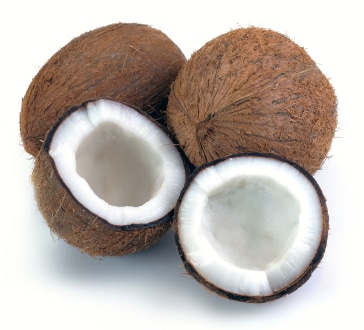
Coconut Oil for Weight Loss
Coconut oil is a good source of medium-chain fatty acids. This is important because most of the fatty acids that humans get in their diet are of the long-chain variety. Unlike long-chain fatty acids that require bile salts to be emulsified and digested, medium-chain fatty acids are passively absorbed from the digestive tract and travel straight to the liver to be broken down for energy. In contrast, long-chain fatty acids are more likely to be stored as body fat.
According to a study published in the American Journal of Clinical Nutrition, the medium-chain fatty acids in coconut oil are three times better for boosting metabolism than long-chain fatty acids. Who couldn’t use a little metabolism boost?
In another study published in the International Journal of Obesity and Metabolic Disorders, coconut oil boosted metabolism in a group of overweight and obese men and reduced the amount of fat they stored after a meal. Other small studies have shown similar benefits in both men and women. Another advantage of coconut oil for weight loss is, like all fats, it slows down the movement of food through the digestive tract, so you feel less hungry. This means less snacking during the day.
Coconut Weight Loss: There Are Still Lots of Unanswered Questions
The medium-chain fatty acids in coconut oil preliminarily look good for weight loss, but more research is needed. Coconut oil is high in saturated fat, which has been linked with high cholesterol levels and heart disease. Some experts counter this argument by pointing out that cultures that consume large amounts of coconut oil enjoy greater longevity, but the verdict is still out on whether it’s safe to add large amounts of coconut oil to your diet.
Then there’s the question of how much coconut oil for weight loss you need to get the benefits. Some sources recommend a tablespoon at every meal. Fortunately, it has a pleasant taste. You can also use it as a substitute for other cooking oils since it doesn’t break down when exposed to heat.
Should You Add More Coconut Oil to Your Diet?
The weight loss benefits of coconut oil are compelling. After all, who doesn’t want to boost their metabolism and reduce the amount of fat they store on their hips, thighs, and tummy? Still, coconut oil is rich in saturated fat, which may not bode well for heart health. It’s also just as high in calories as any other oil. If you decide to use coconut oil for weight loss, use it as a substitute for other oils, not in addition to them. Talk to your doctor before doing this if you have a history of heart disease or high cholesterol.
References:
Natural News. “Coconut Oil Can Promote Weight Loss By Increasing Metabolism Naturally”
American Journal of Clinical Nutrition, Vol. 87, No. 3, 621-626, March 2008
Related Articles By Cathe:
Ten Fascinating Health Benefits of Coconuts
Coconut Sugar: a Healthy Alternative to Sugar or Not?
Natural Coconut Water: Superfood or Not?
Sports Drinks and Hydration Beverages: What Are the Different Types and Do You Really Need Them?

